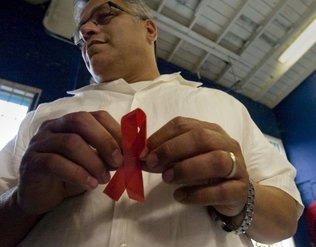
|  |  |  Health & Beauty | October 2008 Health & Beauty | October 2008  
Activists Tackle Problem of Latinos' Growing HIV Threat
 Susan Ferriss - sacbee.com Susan Ferriss - sacbee.com
go to original


| | (lsterling(at)sacbee.com) | | |
In a quiet corner away from the pulsating salsa music and disco lights, Eliego Lopez opened a bag containing an HIV testing kit and cleared his throat professorially.

He shuffled some forms and readied a pen. "Now," he said gently in Spanish to a young man listening intently. "This is the part where I ask you some nosy questions."

Lopez and other AIDS-prevention activists were working the crowd late Tuesday night at Faces, a gay bar and a midtown Sacramento institution.

It was Latino Night at the K Street venue. And Lopez, who works for MAAP Inc., the Mexican American Alcoholism Project, was offering HIV testing, condoms – and advice – as part of National Latino AIDS Awareness Day, which was Wednesday.

A physician when he was in Mexico, Lopez also holds AIDS workshops for male and female farmworkers and hits the streets to talk to urban day workers, who call him "El Maestro del Sexo" – the sex teacher.

Data suggest an urgent need for such outreach: AIDS is attacking Latinos, native-born and immigrant, disproportionately. Nineteen percent of all new diagnosed cases in 2006 in the United States were Latinos, who make up 14 percent of the population.

Public health officials worry that cases of AIDS among Latinos may be far greater, however, because Latinos lag in getting tested. That puts those who have HIV in grave peril of starting treatment too late. It also means they could be spreading the infection here and in Mexico and other home countries.

On both sides of the border, concern is high that AIDS could explode in Mexico if public health workers can't break through silence, traditional homophobia and fear among immigrants, especially the undocumented, to get tested.

Traditional religious beliefs and expectations force many gay Latinos to hide their sexual orientation from family, employers and others. Some are more willing to tell family that they have HIV, Lopez said, before they will disclose that they are gay.

"It was hard to keep getting asked why I wasn't married yet when I was 30," Lopez said, recalling the pressure he felt as a closeted gay man in Mexico.

One-fourth of Mexico's AIDS cases today are among people who spent prolonged time in United States, according to the University of California's Health Initiative of the Americas, a binational partnership to improve health care and prevent diseases.

Research by the related California-Mexico AIDS Initiative shows that returning migrant husbands or partners are the primary transmitters of HIV to rural Mexican women.

Migrant workers in countries around the globe are at greater risk for acquiring HIV, global health experts say, because they're often lonely and turn to prostitutes or engage in other risky behavior.

Lopez said Sacramento day laborers tell him that they are often approached by local men and women who offer to pay them for sex. He warns them that even women can infect them.

Mexico recognizes the binational crisis-in-the-making, said Sacramento Mexican Consul Alejandra Bologna.

Last week, various Mexican consulates, including Sacramento's, teamed up with U.S. health agencies to emphasize HIV testing during Binational Health Week. The weeklong event features health fairs offering flu vaccines, blood-pressure checks and other services.

Bologna said her office is preparing to routinely offer HIV information and testing referrals to anyone who is waiting at the consulate for an appointment on another matter.

Last August, Bologna said, Mexico showed its concern for the epidemic by hosting the 17th International AIDS Conference.

Guadalupe Leyva, 56, a retired nurse who is HIV-positive, attended the conference. "I came back electrified, not just energized," said Leyva, who was at Faces on Tuesday to help with testing.

The activists used an HIV test that involves a simple swab of the mouth and told those tested they could obtain results from counselors in two weeks.

Leyva said he volunteers at Kaiser medical services to help patients cope during their diagnosis and with HIV treatment.

He recalled recently meeting a young man who was diagnosed with HIV, and who, to Leyva's shock, was born the year after Leyva contracted HIV in 1985.

It underscored for him, he said, that many people are still engaging in risky behavior and do not take HIV seriously.

In a Spanish-speaking Latino men's HIV support group Lopez organized, members counsel one another on how to talk to family, how to maintain health and cope with side effects of their medicine.

Jose, who asked that his last name not be used, has been HIV-positive for more than 20 years. The group is a source of strength and hope for him, he said.

"When I started out with this, I felt like I was the only one," he said. "I got depressed, strongly depressed. These guys are my brothers now. We take care of each other."

sferriss(at)sacbee.com |

 |
|  |



